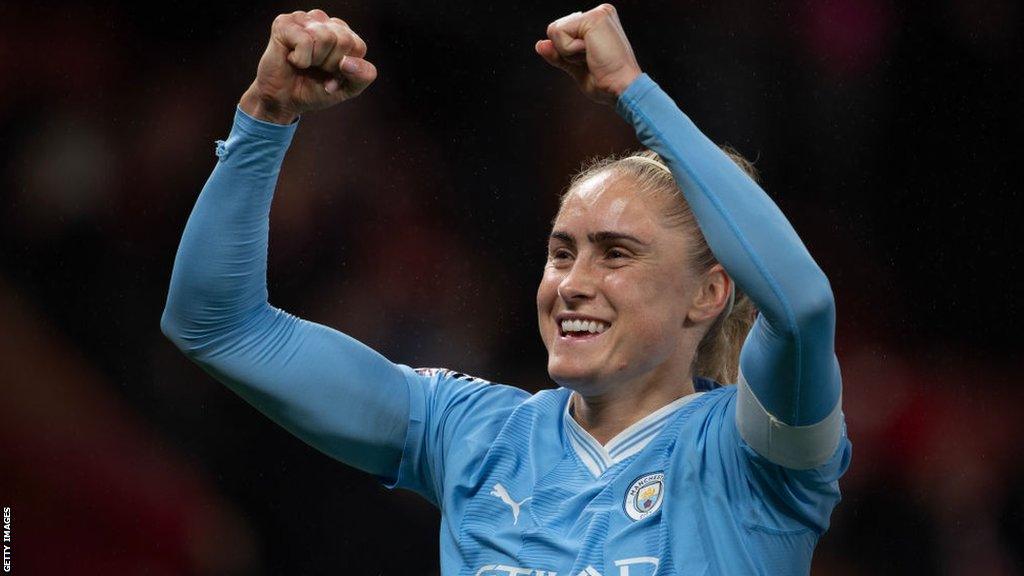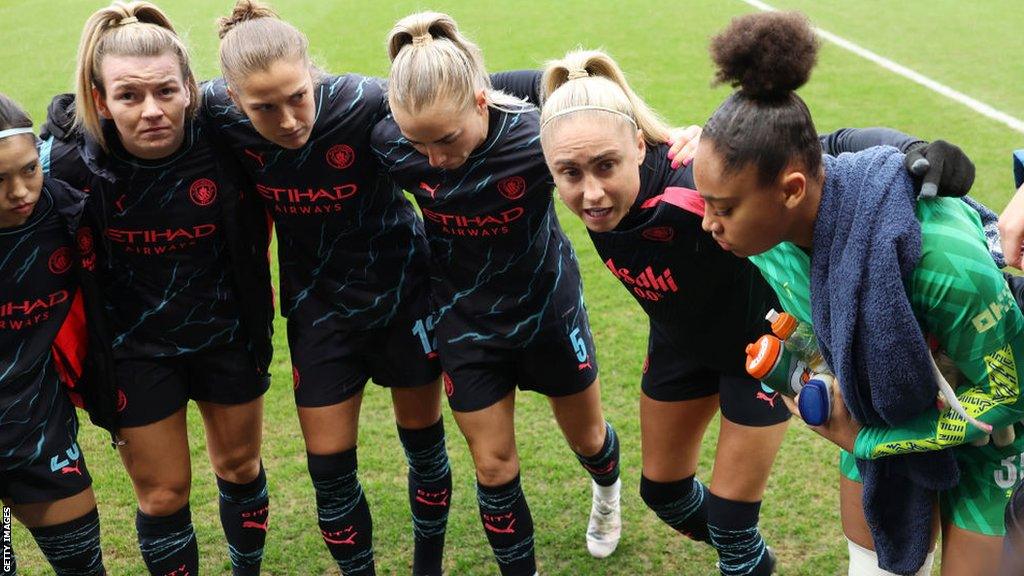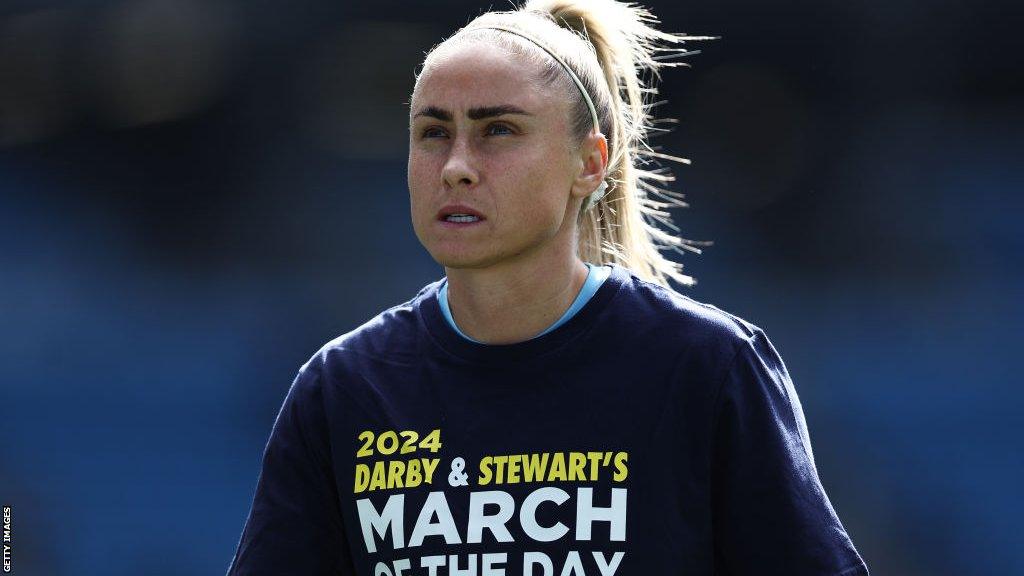Steph Houghton retirement: An iconic figure who leaves women's game in better place
- Published
- comments

Steph Houghton has played for Sunderland, Leeds, Arsenal and Manchester City
There is one moment among many highlights during Steph Houghton's extraordinary career that helps paint a picture of her as a person.
When England were knocked out by USA in the 2019 Women's World Cup semi-finals - after Houghton's 84th-minute penalty was saved - she clasped the hands of the team-mates pulling her up from the ground at full-time, held back her tears and went to speak to the media.
"I've let the team down. I'm gutted and heartbroken. We were so close but I'm proud of everyone because we gave it everything," she said.
It was the mark of a true leader - one of England's greatest - that she would publicly shoulder such responsibility.
This was one of the lowest moments of a brilliant career which has spanned three decades and yet she reacted with the same humility, professionalism and honesty as when enjoying success.
The Lionesses' record goalscorer Ellen White once said she felt "very privileged" to have played alongside Houghton.
Coming from the north-east - a hub of female football talent in the 2000s - Houghton would go on to captain her country for eight years and make 121 appearances.
She represented Great Britain in two Olympic Games and was one of the first female players to be given a central contract by the Football Association and, for a while, was the face of women's football in England.
"There will be girls who have seen Steph play with talent, determination and integrity and gone home and said 'I want to be Steph Houghton'," Baroness Sue Campbell, the FA's director of women's football, said on Wednesday after Houghton announced her retirement at the end of the season.
It was Houghton's face which first broke through in pictures dominated by England's male stars, her name which featured regularly on the back pages of newspapers and her achievements that helped drive investment in the women's game.
She was the first female player to appear on the cover of Shoot magazine, was awarded an MBE by the Queen and received the Freedom of the City in Sunderland.
She also led England during a significant period of growth for women's football, managing increased scrutiny, expectation and media attention, as well as guiding the next generation.
"The women's game has changed so much in the period that she has been involved in it - she has been at the forefront of it," former Scotland winger Pat Nevin told BBC Radio 5 Live.
'We could get through anything with her in the team'

Steph Houghton has won eight major trophies with Manchester City
Houghton said on Wednesday she hoped to "leave the game in a better place than when I started".
There is absolutely no doubt that she has done so.
When the country celebrated Houghton's goal against Brazil at the 2012 Olympic Games in front of 70,584 at Wembley Stadium, it felt like a turning point for women's football.
Since then, she has continued to advocate for professional standards, while improving her game to compete with a new generation of fully professional athletes.
Houghton has won eight major trophies with Manchester City since 2014 and could yet add another WSL title this season.
City boss Gareth Taylor said Houghton would "sacrifice herself" for the team and even when injured, she travelled to games on crutches and gave team talks on the pitch. England team-mate Alex Greenwood said she "set the standards" in training.
Former England defender Gilly Flaherty, a team-mate during Houghton's spell with Arsenal, told BBC Radio 5 Live: ".You knew when you played with her - you went to war with her.
"Even when games got tough you used to look at her, with her armband, and think 'we can get through anything when we have got her there'. I think she gave so much to this country and women's football."
'She could be a coach or a manager'

Steph Houghton's husband Stephen Darby was diagnosed with motor neurone disease in 2018
Houghton has been tested in her personal life too.
Her husband, former Liverpool and Bradford City defender Stephen Darby, was diagnosed with motor neurone disease (MND) in 2018 and Houghton, while still captaining England and playing for Manchester City, began helping to raise awareness of the illness.
Three days before announcing her retirement, Houghton helped complete a 178-mile march from Bradford to Liverpool, raising £130,000.
Continuing to raise awareness for The Darby Rimmer MND Foundation will no doubt remain a priority but Houghton will not be short of offers to stay in football.
Houghton told BBC Sport in January she hoped to "give back to the game" in her hometown and she has enjoyed doing punditry in recent years for broadcast media.
But having already become a mentor to so many of her younger City team-mates, Houghton could have a "phenomenal career" in coaching, White believes.
"She's so technically gifted and tactically astute - she could be a coach or a manager when she retires. She has a phenomenal career ahead of her - big places to go," White told City's club website, external.
Chelsea manager Emma Hayes backed that up on Wednesday, adding: "I don't wish coaching on anyone but if she wants to do it, I think she would be a great asset to someone.
"I'm sure she has some other really important life challenges ahead. She's someone I really admire and respect for the way she carries herself. I wish her the best of luck in whatever she does."